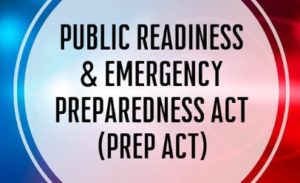Federal Appeals Court Narrows PREP Act Liability Protections

Almost two years after the U.S. government declared COVID-19 a public health emergency, federal courts are beginning to narrow the application of the Public Readiness & Emergency Preparedness (PREP) Act. The Trump Administration invoked the act via emergency declaration in early 2020 to shield providers of pandemic countermeasures from civil liability. A recent, precedent-setting federal appeals court decision raises concern about the scope of protections for hospitals, nursing homes and healthcare providers.
A PREP Act declaration provides statutory immunity from liability claims related to, or resulting from, the administration of treatments and therapies in response to a public health emergency. The immunity also extends to the manufacture, testing, distribution and administration of countermeasures to the emergency. Further, the act establishes a compensation fund for individuals seriously injured by a countermeasure and requires claims involving “willful misconduct” be brought in federal district court. In response to the COVID-19 pandemic, the PREP Act’s protections are retroactive to Feb. 4, 2020, and will remain in effect through the emergency declaration’s conclusion or Oct. 1, 2024, whichever occurs first.
In the case of Maglioli v. Andover Subacute Rehabilitation Center I, the U.S. Court of Appeals for the Third Circuit recently concluded that while the “administration of countermeasures” to the COVID-19 virus falls within the protection of the PREP Act immunity, the failure to administer countermeasures does not.
In the underlying medical liability action, the estates of several decedents asserted state-level claims against two nursing home facilities for medical malpractice, negligence and wrongful death arising from the nursing homes’ alleged failure to safeguard decedents — who were residents of the facilities — against the COVID-19 virus. The action alleged the nursing homes failed to provide masks for all of their employees, monitor visitors, monitor food preparation and monitor residents’ contact with persons outside of the nursing homes, which resulted in the infection of several residents and the resulting deaths of the decedents.
The nursing homes sought to have the action removed to federal court, arguing that the PREP Act provides “complete preemption,” broadly barring state court claims, including those related to a failure to use countermeasures. Therefore, they contended, plaintiffs should be limited to seeking relief through the federal compensation fund or via a “willful misconduct” claim in federal court.
The U.S. Department of Health & Human Services and interested healthcare entities support the complete preemption interpretation of the PREP Act. The American Medical Association, American Hospital Association and various state-level medical associations have filed amicus curiae briefs in support of nursing homes facing similar COVID-related claims in district courts.
The Third Circuit Court of Appeals disagreed, finding the scope of the PREP Act “does not ‘occupy the field’ of negligence or malpractice claims, even if that negligence or malpractice happens to relate to COVID-19 illness. Its effect is confined, for example, to the administration of certain countermeasures, and requires case by case analysis.” On that basis, the Third Circuit remanded the case to state court.
The decision is a mixed bag for the healthcare delivery industry. While it reinforces the PREP Act’s liability protections for the administration of COVID-19 countermeasures, it implies courts will require a strong causal relationship between the use of a countermeasure and the alleged injury to confer immunity. Under this scenario, the earliest days of the COVID-19 pandemic — marred by policy confusion and a shortage of personal protective equipment — may be rife with liabilities not protected by the PREP Act.

